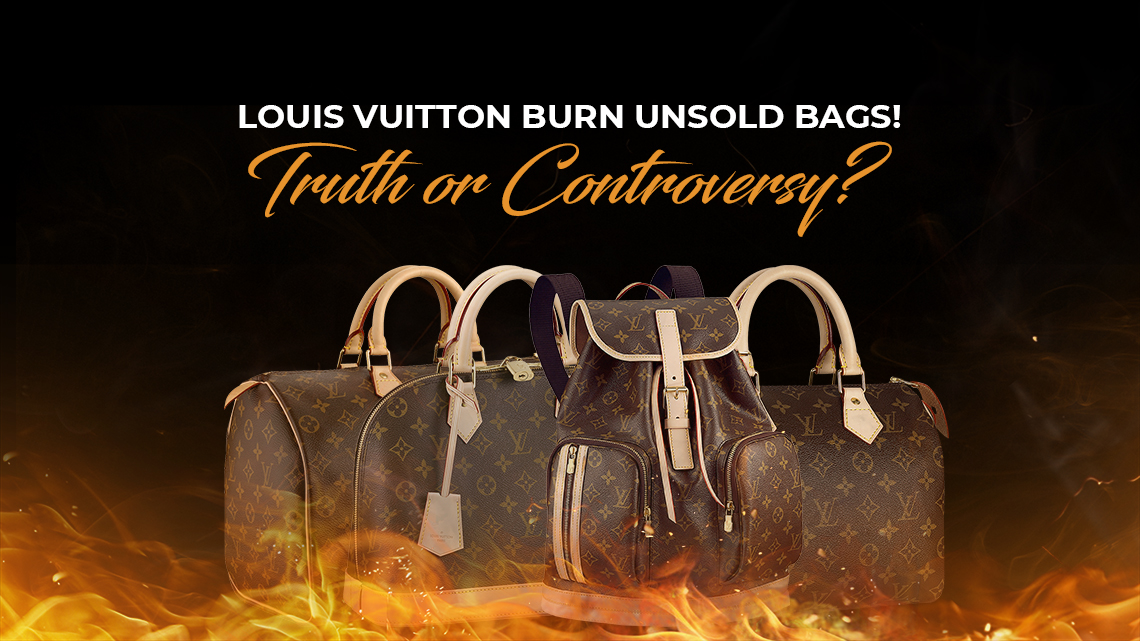Chanel Bags
Do Louis Vuitton? The Truth Behind the Controversy
Louis Vuitton is a luxury fashion brand that has been around since the mid-19th century. Over the years, the brand has become synonymous with high-end fashion and luxury goods. However, there has been a lot of speculation about what the brand does with its unsold merchandise, particularly its bags. One of the most persistent rumors is that Louis Vuitton burns its unsold bags.
So, what is the truth about Louis Vuitton’s unsold bags? Does the Louis Vuitton burn unsold bags? The answer is not entirely straightforward, as there are different reports and claims about what the brand does with its unsold stock. Some sources suggest that the brand does indeed destroy its unsold bags, while others claim that the bags are recycled or donated to charity. In this article, we will explore the different claims and try to get to the bottom of this mystery.
Louis Vuitton’s Sustainability Efforts
Louis Vuitton is committed to sustainability and has taken several measures to reduce its environmental impact. As part of its sustainability efforts, the luxury brand has set a concrete goal to reduce its CO2 emissions by 55% by 2030.
One of the cornerstones of its strategy to improve its environmental performance is to reduce its carbon footprint.
Louis Vuitton is also dedicated to preventing price reductions and theft. To achieve this, the brand destroys unsold merchandise every year, including bags, to ensure that all their customers pay full price for their products. This practice has been met with criticism from some who argue that it is wasteful and harmful to the environment.
However, Louis Vuitton has taken steps to address these concerns. The brand has disclosed progress on its environmental goals, and as reported by WWD, “Vuitton said it already reuses or recycles 93 percent of its event and window.” This shows that the brand is making significant efforts to reduce waste and improve its sustainability practices.
In addition to its sustainability efforts, Louis Vuitton has also implemented other initiatives to reduce its environmental impact. For example, the brand has launched a program to collect and recycle old Louis Vuitton products. The brand also uses sustainable materials in its products, such as organic cotton and recycled polyester.
Overall, Louis Vuitton has demonstrated a commitment to sustainability and is taking concrete steps to reduce its environmental impact. While the brand’s practice of destroying unsold merchandise may be controversial, it is important to note that Louis Vuitton is making significant efforts to reduce waste and improve its sustainability practices.
The Truth About Louis Vuitton Burn Unsold Bags
There has been a lot of speculation and rumors surrounding the practice of burning unsold bags by luxury brands like Louis Vuitton. However, the truth is not as sinister as it may seem.
One reason that some luxury brands burn unsold merchandise is to maintain exclusivity and prevent theft. By destroying unsold bags, they can ensure that their products retain their high value and do not end up in the hands of counterfeiters or resellers.
Another reason that some brands burn unsold merchandise is to comply with tax and customs regulations. In the United States, for example, there is a law called “duty drawback” that allows companies to claim a refund on import duties paid on goods that are later destroyed. By burning unsold bags, brands like Louis Vuitton can save money on import duties and other taxes.
It’s also worth noting that not all luxury brands burn unsold merchandise. Some donate it to charity or recycle the materials to create new products. However, burning unsold bags is a common practice among luxury brands, and it’s not necessarily a sign of wastefulness or disregard for the environment.
Alternatives to Burning Unsold Bags
Louis Vuitton’s practice of burning unsold bags has been a controversial topic for years. While the brand claims that it is necessary to maintain exclusivity and prevent theft, many argue that it is a wasteful and environmentally harmful practice. So, what are the alternatives to burning unsold bags?
One option is to donate the bags to charity. Many organizations, such as Dress for Success and Goodwill, accept donations of gently used designer items. This not only helps those in need, but it also prevents the bags from ending up in landfills.
Another option is to recycle the materials. Leather and other materials used in luxury bags can be repurposed into new products, such as furniture and accessories. This not only reduces waste but also supports sustainable practices.
Some luxury brands, such as Burberry and Gucci, have implemented programs to reuse and recycle their unsold items. Burberry, for example, has pledged to stop burning unsold products and instead will reuse, repair, or donate them. This is a step towards a more sustainable and ethical approach to fashion.
While Louis Vuitton has not yet announced any plans to change their practice, it is important for consumers to demand more sustainable and ethical practices from luxury brands. By supporting brands that prioritize sustainability and ethical practices, consumers can make a positive impact on the fashion industry.
Here are some frequently asked questions about Louis Vuitton and their unsold bags:
Yes, Louis Vuitton does burn some of their unsold bags. This is a method that many luxury brands practice to prevent stock malpractices and theft. According to Fashion Coached, it is a way to maintain the exclusivity of the brand and prevent the bags from being sold in the secondary market at a discounted price.
Burning unsold products is a common practice among luxury brands to protect their brand image and exclusivity. According to Luxury Viewer, it is also a way to prevent the bags from being stolen or sold in the black market at a discounted price. Burning the bags ensures that they are completely destroyed and cannot be used or sold by anyone.
There is no clear answer to this question as it depends on one’s personal beliefs and values. Some people argue that it is wasteful and harmful to the environment to burn perfectly good bags. Others argue that it is necessary for luxury brands to maintain their exclusivity and prevent the bags from being sold at a discounted price in the secondary market. Ultimately, it is up to the individual to decide whether they support this practice or not.
There is no official information on how many bags Louis Vuitton burns each year. However, it is estimated that they burn a significant amount of unsold merchandise to protect their brand image and exclusivity. According to StartupTalky, burning the bags also allows them to reclaim duty payments if the bags are imported into the United States.
Final Thoughts
After conducting research and analyzing the available information, it can be concluded that Louis Vuitton does indeed destroy unsold bags as a part of their stock control and theft prevention strategy. This practice is not unique to Louis Vuitton, as many other luxury brands also destroy unsold merchandise to maintain exclusivity and prevent theft.
While some may find this practice controversial, it is important to note that the fashion industry is a business, and businesses must make decisions that are financially sound. Burning unsold bags is one way for luxury brands to protect their brand image and maintain their exclusivity, while also recouping some of the costs associated with importing their products.
It is also worth noting that Louis Vuitton has taken steps towards sustainability in recent years, with initiatives such as their “Life 360” program, which aims to reduce waste and promote circularity in the fashion industry. While burning unsold bags may seem counterintuitive to these efforts, it is important to consider the larger context of the fashion industry and the challenges that luxury brands face in maintaining their image and profitability.
In conclusion, while the practice of burning unsold bags may be controversial, it is a common strategy employed by luxury brands such as Louis Vuitton. As the fashion industry continues to evolve and face new challenges, it will be interesting to see how brands adapt and innovate in response.

